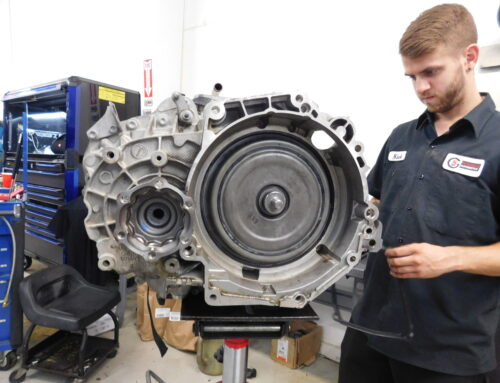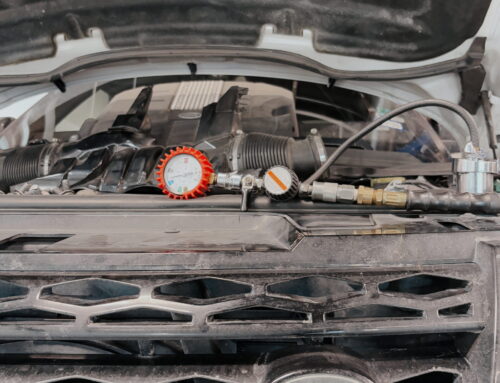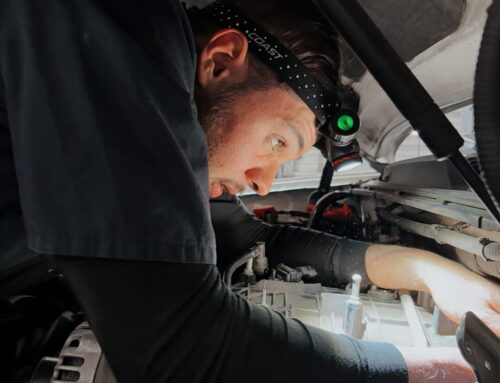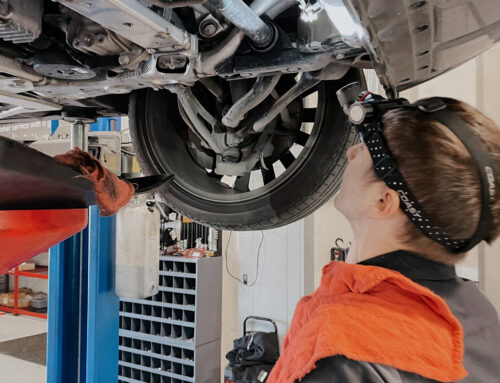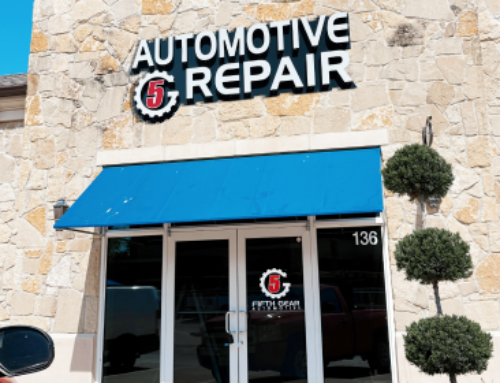When it’s time for routine vehicle maintenance, or when it’s time for a repair, car and truck owners in Highland Village, TX have two choices:
- A dealer
- An independent auto repair shop
We’ve discussed how to find an auto repair shop in Highland Village, TX you can trust. But how does that independent garage differ from the dealer and when should you go to one over the other?
Understanding Routine Maintenance and Repair
This usually — but NOT always, as studies have shown — determines where people take their vehicles:
- Most (but not all) people go to a dealership if their car or truck is covered by the original warranty and they want the manufacturer to pay for the fix.
- They also go to the dealership if the vehicle or a part has been recalled.
- If there’s an extended warranty involved, sometimes they have no choice — the terms dictate where repairs must be made.
- They want to use only original, from-the-manufacturer parts in their car or truck.
Consumer Attitude Shifting
Interestingly, studies over the last five to seven years by organizations such as the National Institute for Automotive Service Excellence (NIASE) and Consumer Reports have noted a shift among vehicle owners:
They are taking their cars and trucks to independent auto facilities over dealerships for pretty much everything, in or out of warranty.
In one study, the NIASE noted that 70 percent of car owners go to independents for what is known as “aftermarket” care while the cars are still under warranty.
(By the way, in case you’re wondering, thanks to the Magnuson-Moss Warranty Act of 1975 — which applies to all sorts of products, not just cars — dealers must honor warranties even if you go to an independent to get the work done. Just make sure you keep all the service records to prove regular maintenance.)
Consumer Reports also found that independent auto repair shops often outscore dealership service for overall satisfaction, price, quality, courteousness of the staff, and timeliness of work .
The biggest complaint regarding dealership service was the cost of parts and labor. Mercedes-Benz drivers, as an example, were much more satisfied with the price they paid at independent auto repair facilities than they were at dealerships. However, BMW, Porsche, and VW owners were equally satisfied with dealers and independents.
Comparing Dealers and Independents
So what gives? Are dealers better than independents? Or are the independents better than the dealers? Does it even matter?
To provide some perspective, here is a look at the two organized by topic.
Technical — Dealers
This is one of the dealers’ biggest advantages. Technicians and mechanics are manufacturer-trained specialists that only work on your brand of car, maybe even that model.
In order to maintain their franchises dealerships must pay for training for their technicians and provide special tools and equipment.
Dealers also have quicker access to proprietary information on vehicles they sell and service. In theory, since they are very familiar with a particular car or truck, they can pinpoint a problem more quickly and more accurately.
Technical — Independents
Don’t think the independents, though, are at a big technical disadvantage. In fact, it may be the opposite. Many independent shops are started by former dealer employees who want to operate their own businesses. They often hire technicians and mechanics with dealer experience. Also, an independent garage may choose to specialize (just like the dealerships) in specific style of automobile — German or European.
Auto repair shops in Highland Village, TX and surrounding areas stay current and — most importantly — competitive by taking classes and getting certified through ASE automotive service excellence. They’re often learning what their counterparts at dealerships are learning.
Because of rapid change in automotive technology, it is vital that the auto repair shop in Highland Village, TX you use is up to speed (pardon the pun) on the latest tech, training, and equipment. Otherwise they won’t keep up with the competition — dealers or independents.
Recalls and Service Bulletins — Dealers
Dealer service departments have a distinct advantage when it comes to manufacturer recalls and technical service bulletins. If you’ve moved since you first bought your car, or if the manufacturer doesn’t have a current address on file, you may have no clue there’s an open recall on your car. Dealers automatically check for recalls when you come in for service.
Recalls and Service Bulletins — Independents
Automotive service software such as Alldata and Mitchell OnDemand5 has allowed independent garages to get updated manufacturer information on recalls and technical service bulletins on a monthly basis.
Keep in mind Alldata and Mitchell OnDemand5 are paid memberships and not every auto repair shop in Highland Village, TX will have this or other software at their disposal. Check to make sure that your garage subscribes to such a service and is current.
Parts Quality and Price — Dealers
Dealers offer only OEM (Original Equipment Manufacture) parts, which represent a standard of quality and engineering that only the manufacturer authorizes. These parts, however, are often more expensive than what an independent offers.
Parts Quality and Price — Independents
While dealers offer only OEM parts, small auto repair shops in Highland Village, TX and elsewhere can offer OEM (if available) and aftermarket, which are substitutes for the OEM part.
The advantage of aftermarket parts is that, like generic prescription drugs, they are supposed to perform the same and function for a lot less money. Often a lot less. Be sure, however, to request high-quality aftermarket parts because not all aftermarket brands are of the same quality.
Facilities — Dealers
Dealers have a perceived advantage when it comes to facilities. They get manufacturers’ assistance with start-up costs and equipment. They get first dibs on any of the manufacturers’ newly developed service tools, specifications and, as noted, recall and service bulletins.
Dealers usually have larger facilities, meaning more service bays are available to accommodate more customers. This, however, doesn’t always translate to quicker turnaround time. It’s usually more difficult to get prompt service at large, busy dealerships, especially without an appointment.
Facilities — Independents
So how can small repair shops compete with dealers on facilities?
Square foot for square foot, pound for pound, they usually can’t, but that doesn’t mean an auto repair shop in Highland Village, TX only accommodates one car at a time. What’s important is that smaller shops have enough space to work on several services and repairs at any one time.
Since smaller shops incur far less overhead costs than dealer facilities, they charge you less. Often a lot less.
Another thing to keep in mind is that, although smaller shops have fewer service bays, they are more nimble and can provide faster service on shorter notice, whereas your car may be in line behind a dozen others at a dealer service department if you arrive after 8 a.m.
Price of Labor — Dealers and Independents
Price stands out as the biggest advantage that small shops have over dealerships. Depending on your budget, that can outweigh any and all advantages the dealer has to offer.
The overhead at dealer service departments translates into a higher labor rate per hour — roughly $15-$20 per hour higher, sometimes more — than that of independent facilities. There can also be a huge disparity in parts price markup. Add it up and your total bill with a dealer could be significantly more.
Personal Relationships — Dealers
This is another area where dealers suffer in comparison with independent auto repair facilities.
At large dealerships you’re often a number on a computer printout. You’ll have no idea who is working on your car, what his experience is, or if the same mechanic will ever work on your car again.
Dealerships employ “service advisors” as a go-between you and the repair staff. While service advisors know plenty about the vehicles they handle, their role is more of a salesman than of an expert mechanic. They can be an annoying middleman.
Personal Relationships — Independents
At independent auto shops it’s rare that you have to deal with “service advisors” or a middleman. If you want to talk to the mechanic, ask the shop owner or the person manning the front counter. Smaller facilities allow for direct communication and trust, which takes time to develop, but it’s worth the effort.
Location and Convenience — Dealers and Independents
It’s not unheard of to buy a vehicle at a local, nearby dealership, if there happens to be one you like. But more often than not, you’re having to travel to nearby towns or the big city to find the manufacturer, style of car or truck, color, and price, among other considerations, you want. When it’s time for service or repair, it’s not always convenient to return to that dealership or even one in a nearby town.
Independent facilities are often more accessible because they are meant to service the community. There may be a dozen small auto repair shops in Highland Village, TX between your residence and a dealership.
Chances are, if the needed repair or service isn’t major, it’s much more convenient to drive to a neighborhood repair shop than it is to go miles away to a dealer, especially if you need to leave your car for servicing.
True, many dealer service departments provide a shuttle back to your office or home, provided it’s no farther than five or 10 miles away. Many luxury-brand dealers will go the extra mile, providing consumers with loaner cars while work is being performed on their car.
Even so, that’s not to say an independent auto repair shop will leave you stranded in a dingy, smelly waiting room. No, they need to keep up with the competition as they can — offering free WiFi (internet) access or a ride to your office or home, just not as immediate as the dealer.


